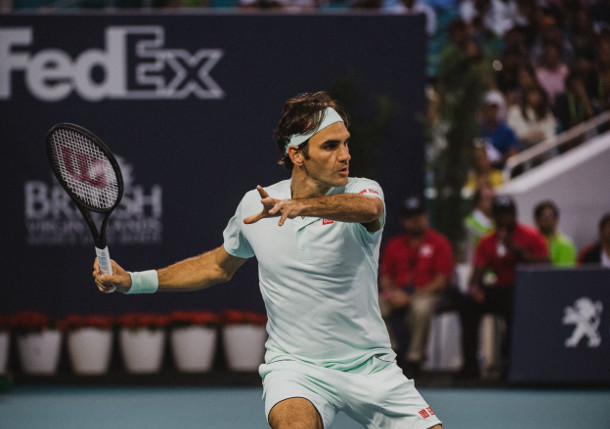
By Richard Pagliaro
Roger Federer's Miami Open is over before it began.
The 2019 Miami Open champion has withdrawn from the tournament.
More: Federer Fires Up Fans
The 39-year-old Swiss is set to launch his comeback in Doha next week after missing 13 months recovering from a pair of arthroscopic right knee surgeries.
It will be Federer's first match since bowing to Novak Djokovic in the 2020 Australian Open semifinals. Federer may play Dubai as well before taking a training break.
Two years ago, Federer demolished defending champion John Isner, 6-1, 6-4, in the Miami Open final to capture his 101st career championship, including his 28th Masters crown.
It was Federer’s fourth career Miami championship and first at the Hard Rock Stadium a full 17 years after Federer fell to Andre Agassi in the 2002 final at Crandon Park on Key Biscayne.
“It’s been an absolutely super-long journey,” Federer said after taking the title. “I got a wild card here back in ‘99 and made my first final here back in 2002 vs. Andre Agassi. “Miami’s always been my first sort of tournament I traveled to internationally as a junior so to stand right here really means a lot."
Federer's departure from the Miami field raises the question: Will world No. 1 Novak Djokovic and second-ranked Rafael Nadal, who pulled out of Rotterdam and Acapulco, compete given the reduction in tournament prize money?
In an interview with writer Rene Stauffer last week, Pierre Paganini, Federer's long-time trainer, said it was important to proceed with caution in the coming weeks as the muscles around the 20-time Grand Slam champion's knee had atrophied a bit during his 13-month break.
"The big difference is: When he paused to Australia after Wimbledon in 2016, his muscles were actually always there. Now we had a total interruption in which the muscles deteriorated considerably," Paganini said. "There was a long time between the first operation and the moment in July when we said we could slowly start working progressively again. His muscles were no longer in the same condition at all, the imbalances were extreme. His muscles could no longer work immediately and needed a longer recovery time.
"When I started working with him, we were at the bottom. That means: You try to do everything that is possible. At the same time, you have to do it several times so that the body learns to endure repetitions at a certain level. And then you have to pause and see how the body reacts."
Federer will assess his body after Doha before setting his spring schedule.
"Roger only plays when he knows that he can play well again. Now we all have to see how the body reacts," Paganini said. "It is important to protect him. You have to have done a lot by now if you want to get back on the court. It's really not comparable to 2016. Roger is already celebrating a big win if he can go back on the court, play and then say: Hey guys, I played, I was fine, I'm looking forward to the next match. Or, if he lost, to the next tournament."
Photo credit: Lindsey Godwin/Miami Open